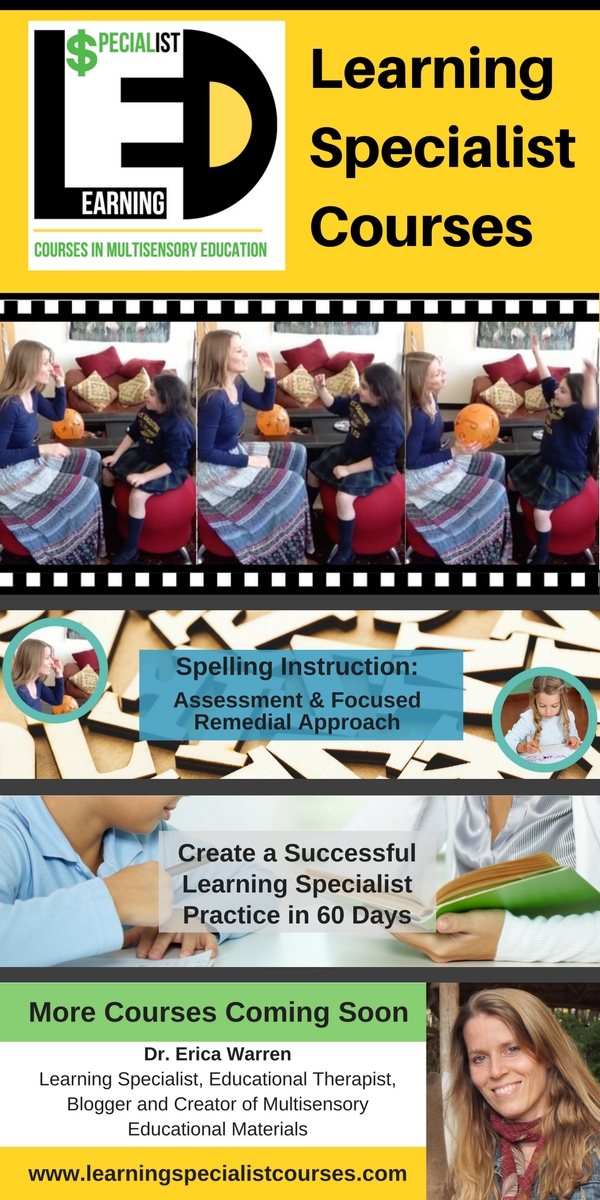This week I wanted to tell you about my online store, Good Sensory Learning. I’m Dr. Erica Warren, and I established this site so I could share all the materials that I have created over the last 20+ years as a learning specialist and educational therapist. When I first began my private practice, Learning to Learn, I had great difficulty finding fun and multisensory materials for my students that were effective and engaging. So back in 2005, I made it my mission to design and distribute high-end, remedial products as well as memorable, motivating lessons that bring delight to learning. If you would like to try a free sampling of my activities , CLICK HERE . How Are the Products Organized at Good Sensory Learning? You can download my Free Printable Catalog or you can browse the site using the grey “search all products” bar in the top right of any page with keywords such as dyslexia, working memory, and executive functioning. What’s more, drop down menus in the red banner allow you t...
Would you like to open your own tutoring or learning specialist practice?
Do you want the FREEDOM and INDEPENDENCE to make a difference?
Do you know what it takes to CONNECT with and EMPOWER students?
Do you want to be a part of a MULTISENSORY, TAILORED and PERSONALIZED method that you can deliver in your own private practice while having access to a support community of likeminded professionals?
You Don’t Have to Do It Alone!
Whether you would like to create a private practice from scratch, or you already have an established business, I would love to help you. You can now gain access to my secrets, expertise, methods, swipe notes and a support community of likeminded professionals as well as a growing selection of promotions from the best resources and companies. This and more is all available in my evergreen course Create a Successful Learning Specialist Course in 60 Days.
If you Answered Yes to Any of the Questions Above, Watch this Video to Learn More.
How Can I Learn More about Dr. Warren's Teaching Style?
Come and read my testimonials, or if you would like to learn more about my teaching style, you can watch my first video in the series - Learning Specialist Secrets: a 3-Part Video Series! This will enable you to experience my own multisensory teaching approach and you can experience a sampling of my great content! I will cover: The 5 Key Benefits of a Learning Specialist Practice.
 About Dr. Erica Warren:
About Dr. Erica Warren:
Aspiring to empower "out of the box" learners, I created a degree program that united coursework and research in School Psychology, Special Education, Psychology, and Adult Education. With a full assistantship at the UGA Learning Disability Center in assessment, I pursued a doctorate that focused on life-long issues in learning, the impact of learning difficulties across the lifespan, and comprehensive diagnostic evaluations. In addition, I earned a full assistantship with the National Science Foundation while working towards a Masters degree in Educational Psychology. I often refer to my bachelor’s degree in fine arts as my secret weapon as it brings joy, color and creativity into my sessions.
Now you can take advantage of my extensive training along with 18 years experience directing my own business, Learning to Learn. I have the tools and strategies for success and I would love to share them with you.
Whether you would like to create a private practice from scratch, or you already have an established business, I would love to help you. You can now gain access to my secrets, expertise, methods, swipe notes and a support community of likeminded professionals as well as a growing selection of promotions from the best resources and companies. This and more is all available in my evergreen course Create a Successful Learning Specialist Course in 60 Days.
If you Answered Yes to Any of the Questions Above, Watch this Video to Learn More.
Come and read my testimonials, or if you would like to learn more about my teaching style, you can watch my first video in the series - Learning Specialist Secrets: a 3-Part Video Series! This will enable you to experience my own multisensory teaching approach and you can experience a sampling of my great content! I will cover: The 5 Key Benefits of a Learning Specialist Practice.
Aspiring to empower "out of the box" learners, I created a degree program that united coursework and research in School Psychology, Special Education, Psychology, and Adult Education. With a full assistantship at the UGA Learning Disability Center in assessment, I pursued a doctorate that focused on life-long issues in learning, the impact of learning difficulties across the lifespan, and comprehensive diagnostic evaluations. In addition, I earned a full assistantship with the National Science Foundation while working towards a Masters degree in Educational Psychology. I often refer to my bachelor’s degree in fine arts as my secret weapon as it brings joy, color and creativity into my sessions.
Now you can take advantage of my extensive training along with 18 years experience directing my own business, Learning to Learn. I have the tools and strategies for success and I would love to share them with you.
Cheers, Dr. Erica Warren
Dr. Erica Warren is the author, illustrator, and publisher of multisensory educational materials at Good Sensory Learning and Dyslexia Materials. She is also the director of Learning to Learn and Learning Specialist Courses.
· Blog: https://learningspecialistmaterials.blogspot.com/
· YouTube Channel: https://www.youtube.com/user/warrenerica1
· Podcast: https://godyslexia.com/
· Store: http://www.Goodsensorylearning.com/ & www.dyslexiamaterials.com
· Courses: http://www.learningspecialistcourses.com/
· Newsletter Sign-up: https://app.convertkit.com/landing_pages/69400
· Blog: https://learningspecialistmaterials.blogspot.com/
· YouTube Channel: https://www.youtube.com/user/warrenerica1
· Podcast: https://godyslexia.com/
· Store: http://www.Goodsensorylearning.com/ & www.dyslexiamaterials.com
· Courses: http://www.learningspecialistcourses.com/
· Newsletter Sign-up: https://app.convertkit.com/landing_pages/69400


Comments
Post a Comment